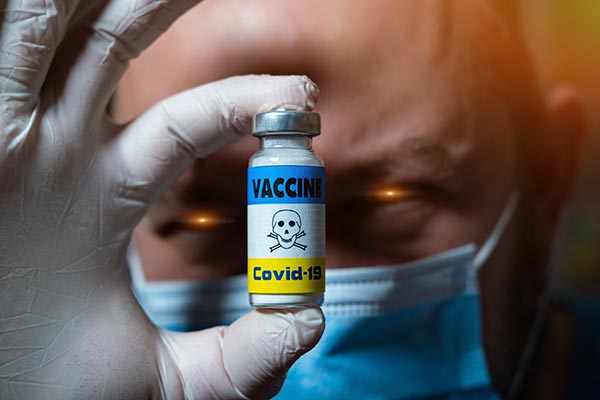Scientists now plotting the use of “self-spreading” vaccines to inoculate more people
06/14/2021 / By Ramon Tomey

Many countries have turned to vaccines to address the Wuhan coronavirus (COVID-19) pandemic. However, a number of scientists have proposed the use of “self-spreading vaccines” that transmit immunity instead of sickness. While the concept itself has not been implemented in real life, it is not entirely without risk.
The concept first emerged in a 2018 Johns Hopkins Bloomberg School of Public Health report. According to the report by the institution’s Center for Health Security (CHS), self-spreading vaccines “could dramatically increase coverage” in human populations without the need for inoculating persons one at a time. The report’s authors elaborated: “Only a small number of vaccinated individuals would be required to confer protection to larger susceptible population, thus eliminating the need for mass vaccination operations.”
According to the report, self-spreading vaccines could theoretically come in two forms. Transferrable types are restricted to a single round of transmission, while transmissible types are capable of spreading indefinitely. While scientists acknowledge that such kinds of vaccines are still not mainstream, they believe that the revolution in genome engineering will bring self-spreading vaccines closer to reality.
Self-spreading vaccines could also address the issue of vaccine hesitancy in certain populations. Social and behavioral scientists utilize soft science techniques to convince people to get vaccinated. Current strategies to encourage vaccinations use prizes and rewards – such as a chance to win cash prizes and free items at food establishments.
Interestingly, the CHS co-sponsored the Event 201 pandemic exercise – which simulated real-life coronavirus outbreak – a year after it released the report. The World Economic Forum and the Bill & Melinda Gates Foundation also sponsored the October 2019 event. A January 2020 CHS statement clarified that it “modeled a fictional coronavirus pandemic” during the exercise and “explicitly stated that it was not a prediction.” The statement continued: “[The Event 201] exercise served to highlight preparedness and response challenges that would likely arise in a very severe pandemic.”
Self-spreading vaccines are not without their own respective issues
The idea of vaccines that transmit immunity throughout the population has garnered the attention of a number of entities. Government agencies such as the National Institutes of Health and the Defense Advanced Research Projects Agency have put self-spreading vaccines into their funding pipelines. Private entities such as the Gates Foundation have also expressed interest in funding such an endeavor.
At first glance, self-spreading vaccines have a clearer advantage over mass vaccination programs. However, the authors of the CHS report acknowledged two “big challenges” with the idea.
First, self-spreading vaccines override the concept of informed consent. The Nuremberg Code of 1947 outlined the concept: “The voluntary consent of the human subject is absolutely essential. This means that the person involved should have legal capacity to give consent … without the intervention of any element of force, fraud, deceit, duress, … constraint or coercion.” (Related: Health freedom advocates file informed consent lawsuit to exempt all persons from mandatory vaccination.)
The authors noted that in the case of self-spreading vaccines, directly vaccinated individuals would have the option of informed consent. However, those people who will contract the self-spreading vaccine would not have that option. They also noted the risk of self-spreading vaccines causing life-threatening adverse reactions. “The ethical and regulatory challenges surrounding informed consent, and prevention and monitoring of adverse events, would be critical challenges to implementing this approach – even in an extreme event,” they wrote.
Second, the CHS authors noted that the virus used in self-spreading vaccines could revert to a wild-type pathogen. One example would be the virus used in the polio vaccine. In some instances, the virus reverted to its wild form – making it more infectious and damaging the nervous system. “This is both a medical … [and] public perception risk; the possibility of vaccine-induced disease would be a major concern to the public,” the CHS report said.
An outbreak of wild polio in South Sudan last year illustrated this potential risk. Back in October 2020, health officials in the East African nation confirmed the outbreak. The South Sudan Ministry of Health (MOH) said 15 cases of vaccine-derived polio were identified in the country’s northwestern region.
MOH Director-General for Preventative Health Services Dr. John Pasquale Romunu attested to the polio outbreak in South Sudan. He told reporters: “Yes, there is an outbreak of vaccine-derived polio and the [MOH] and its partners are working on it. [I] think it is under control, [though it] has affected quite a number of counties and states.”
The polio vaccine is made from a weakened form of the original virus and is administered orally. However, the weakened virus mutates and becomes more infectious – ironically causing disease instead of preventing it, as in the case of South Sudan. (Related: South Sudan confirms new outbreak of vaccine-related polio.)
Head over to VaccineDamage.news to read more about the risks of self-spreading vaccines.
Sources include:
Tagged Under: Center for Health Security, covid-19 pandemic, health freedom, informed consent, mass vaccination, Medical Tyranny, self-spreading vaccines, vaccine-induced outbreak, Wuhan coronavirus
RECENT NEWS & ARTICLES
COPYRIGHT © 2017 MEDICAL EXTREMISM





















